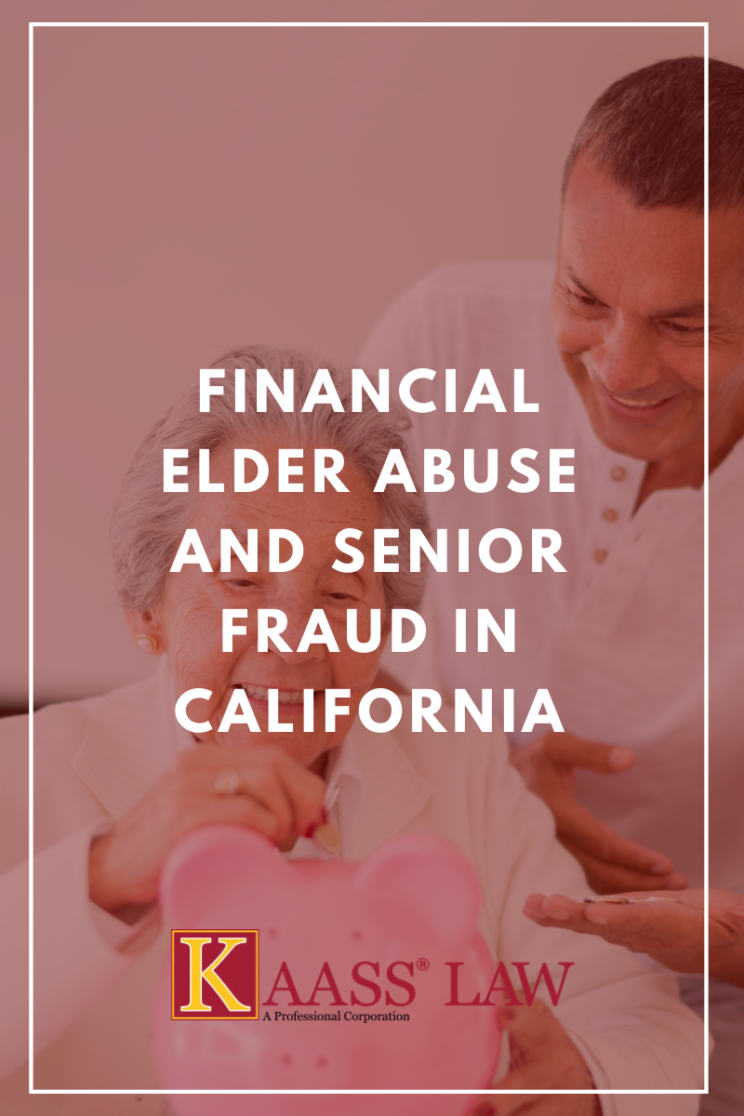What Is Financial Elder Abuse or Senior Fraud in California?
Financial elder abuse or senior fraud can take different forms and can be committed by caregivers, family members, strangers, or any other people known to the elder. Financial abuse may have the same impact as physical abuse.
Elements of Elder Financial Abuse
According to CACI 3100, in case the plaintiff claims that the defendant violated the Elder Abuse and Dependent Adult Civil Protection Act by taking financial advantage of him, he must prove the following elements to establish this claim:
- Defendant took, hid, appropriated, obtained, or retained the plaintiff’s property; or
- assisted in taking, hiding, appropriating, obtaining, or retaining the plaintiff’s property;
- Plaintiff was sixty-five years of age or older at the time of the conduct;
- Defendant took, hid, appropriated, obtained, or retained/assisted in taking, hiding, appropriating, obtaining, or retaining the property for wrongful use or with the intent to defraud or by undue influence;
- Plaintiff was harmed; and
- Defendant’s conduct was a substantial factor in causing harm to the plaintiff
The plaintiff can establish the defendant’s illegal conduct by proving that he knew or should have reasonably known that his actions were likely to be harmful to the plaintiff. Such as, the defendant took, hid, appropriated, obtained, or retained the property, in case the plaintiff was deprived of the property by an agreement, will, gift or trust, regardless of whether the property was held by the plaintiff or by his representative. A representative is an individual or an entity or, that is either:
- A trustee;
- A conservator;
- Another representative of the estate of an elder; or
- An attorney-in-fact of an elder who acts within the authority of the power of attorney
A false misrepresentation lawyer can take a look into your situation for you if you feel as though you need legal assistance.
What is Undue Influence?
According to California Civil Code Section 1575, undue influence is a misuse of a person’s power and role to exploit the dependency, trust, or fear of another person in order to misleadingly gain control over that person’s decision-making and obtaining an unfair advantage over him/her.
Examples of Elder’s Financial Abuse
Common examples of elder’s financial abuse include:
- Taking personal property or money from the elder
- Repeatedly borrowing money and not returning it
- Denying medical care or services or conserving funds
- Using neglect of abuse to convince the elder to give up his assets
- Convincing to invest in worthless property or companies
- Selling the elder’s goods without his consent permission
Statute of Limitations for Elder Financial Abuse
According to California Welfare and Institutions Code Section 15657.7 for financial elder abuse claims, the statute of limitations is four years. The statute of limitation beings to run from the time the plaintiff discovers the facts, constituting financial abuse, or when the abuse should have been discovered with reasonable diligence.
Remedies for Elder Financial Abuse
Civil remedies for elder financial abuse include:
- Compensatory damages;
- Punitive damages for fraud, breach of fiduciary duty;
- Restitution;
- Reasonable attorney fees and costs; and/or
- Equitable remedies
Glendale Elder Financial Abuse Attorney
If you believe that you or someone you know have been a victim of elder financial abuse, we invite you to contact our Glendale elder financial abuse attorneys at (310) 943-1171, for a free consultation.

